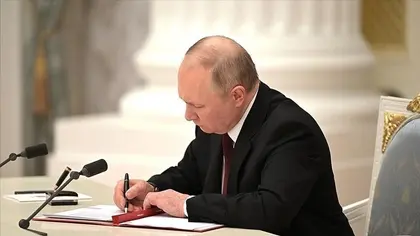President Vladimir Putin has officially signed-off a series of amendments to the Russian Criminal Code, establishing harsher punishments for Russians who flee from the battlefield, refuse to be conscripted, surrender, or engage in looting.
The new laws also introduce the terms “mobilization”, “wartime”, and “martial law”, and follows the Russian president’s recent announcement that over 300,000 Russian citizens will be drafted to fight in the ongoing illegal invasion of Ukraine.
Under the new amendments, soldiers who fail to obey an order issued by a superior “in wartime or in conditions of an armed conflict or the conduct of hostilities,” will be punished by imprisonment of up to three years. “Serious” acts of insubordination will be punished via up to ten years imprisonment – although the amendments do not define what acts are to be considered “serious”.
An article criminalizing looting has also been amended to impose a sentence of up to 15 years behind bars for offenders, while reservists will be prosecuted for arbitrary abandonment of their units or for failing to report for duty “in due time.”
The amendments have been passed into law seemingly in response to large anti-conscription protests that have sparked across Russia in recent days and to the stark rise in the number of Russian citizens flocking to cross the nation’s borders to avoid being drafted.
The mobilization of Russian citizens – the first mobilization since World War II – has led to thousands desperately trying to book flights out of Russia, with planes becoming fully booked and fares dramatically increasing in price.

EU Transfers €1.5 Bln Raised From Russian Assets for Ukraine
Meanwhile, queues stretching for miles continue to form at Russia’s border crossings, with some men waiting over 24 hours to leave the country, while others are being stopped by police and recruitment officials and sent back for conscription.
Witnesses on the border with Georgia told British newspaper The Guardian on Monday, Sept. 26, that some men are now resorting to using bicycles to skip the traffic jams.
Governments from neighboring nations are now debating whether or not to allow the Russian deserters to cross into their countries.
“It may be the moment to rethink the issue of visas to Russians,” Gérard Araud, a veteran French diplomat and former ambassador to the US tweeted on Sunday. “Helping the men who want to flee from being mobilised would be a humanitarian and military good decision.”
On Friday, Germany considered the possibility of allowing Russians to enter their territories, with a government spokesman telling journalists at a news conference that it welcomed reports that many Russians wished to avoid fighting in Ukraine.
“Many Russians who are now being called up do not want to take part in this war either. This is a good sign,” the spokesman added. “A way must be left open for Russians to come to Europe and also to Germany.”
Others, however, have already closed their borders to most Russians, including the three Baltic countries. Lithuanian defense minister, Arvydas Anušauskas, said on Thursday that “being drafted into the army is not enough” for Russians to be granted asylum.
Agreeing with this sentiment, Estonian foreign minister Urmas Reinsalu said on Friday: “A refusal to fulfil one’s civic duty in Russia or a desire to do so does not constitute sufficient grounds for being granted asylum in another country.”
You can also highlight the text and press Ctrl + Enter






